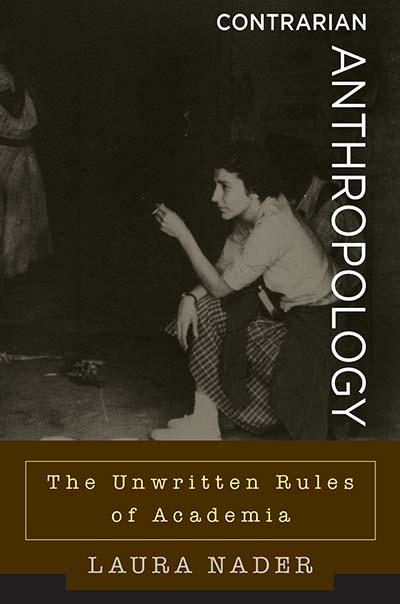We’re delighted to offer a selection of latest releases from our core subjects of Anthropology, Archaeology, Genocide Studies, History, Museum Studies, Political Economy and Refugee & Migration Studies, along with our New in Paperback titles.
The Unwritten Rules of Academia
Laura Nader
Analyzing the workings of boundary maintenance in the areas of anthropology, energy, gender, and law, Nader contrasts dominant trends in academia with work that pushes the boundaries of acceptable methods and theories. Although the selections illustrate the history of one anthropologist’s work over half a century, the wider intent is to label a field as contrarian to reveal unwritten rules that sometimes hinder transformative thinking and to stimulate boundary crossing in others.
Read Introduction
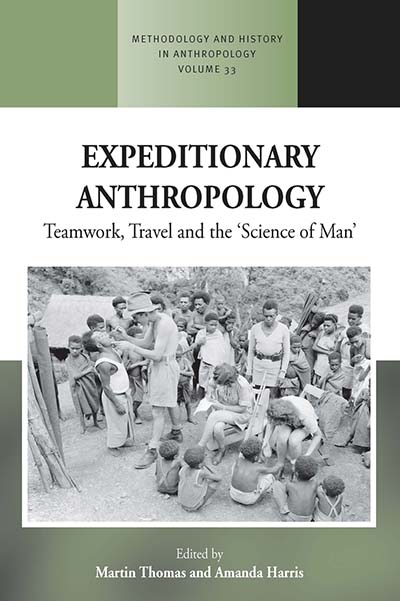 EXPEDITIONARY ANTHROPOLOGY
EXPEDITIONARY ANTHROPOLOGY
Teamwork, Travel and the ”Science of Man”
Edited by Martin Thomas and Amanda Harris
Volume 33, Methodology & History in Anthropology
The origins of anthropology lie in expeditionary journeys. But since the rise of immersive fieldwork, usually by a sole investigator, the older tradition of team-based social research has been largely eclipsed. Expeditionary Anthropology argues that expeditions have much to tell us about anthropologists and the people they studied. The book charts the diversity of anthropological expeditions and analyzes the often passionate arguments they provoked. Drawing on recent developments in gender studies, indigenous studies, and the history of science, the book argues that even today, the ‘science of man’ is deeply inscribed by its connections with expeditionary travel.
Read Introduction: Anthropology and the Expeditionary Imaginary: An Introduction to the Volume
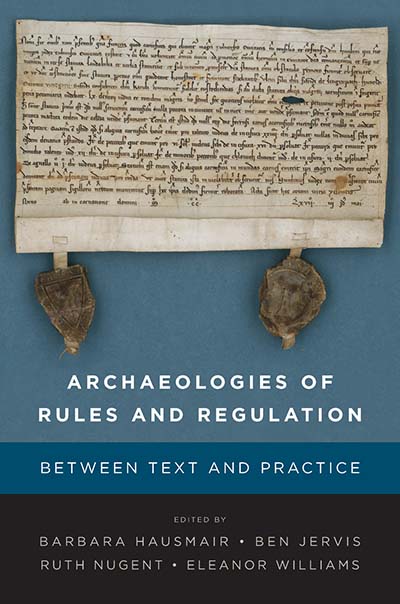 ARCHAEOLOGIES OF RULES AND REGULATION
ARCHAEOLOGIES OF RULES AND REGULATION
Between Text and Practice
Edited by Barbara Hausmair, Ben Jervis, Ruth Nugent, and Eleanor Williams
How can we study the impact of rules on the lives of past people using archaeological evidence? To answer this question, Archaeologies of Rules and Regulation presents case studies drawn from across Europe and the United States. Covering areas as diverse as the use of space in a nineteenth-century U.S. Army camp, the deposition of waste in medieval towns, the experiences of Swedish migrants to North America, the relationship between people and animals in Anglo-Saxon England, these case studies explore the use of archaeological evidence in understanding the relationship between rules, lived experience, and social identity.
Read Introduction: Archaeologies of Rules and Regulation: An Introduction
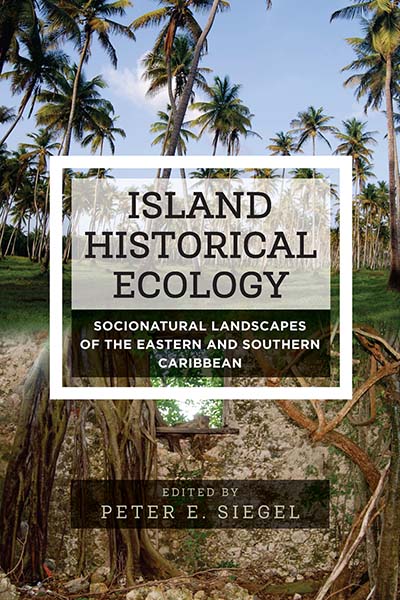 ISLAND HISTORICAL ECOLOGY
ISLAND HISTORICAL ECOLOGY
Socionatural Landscapes of the Eastern and Southern Caribbean
Edited by Peter E. Siegel
Foreword by William Balée
In the first book-length treatise on historical ecology of the West Indies, Island Historical Ecology addresses Caribbean island ecologies from the perspective of social and cultural interventions over approximately eight millennia of human occupations. Environmental coring carried out in carefully selected wetlands allowed for the reconstruction of pre-colonial and colonial landscapes on islands between Venezuela and Puerto Rico. Comparisons with well-documented patterns in the Mediterranean and Pacific islands place this case study into a larger context of island historical ecology.
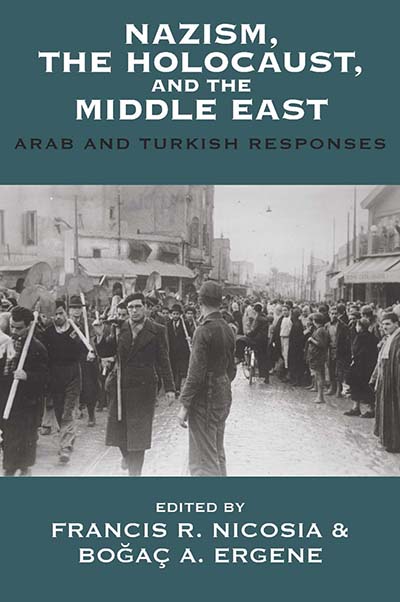 NAZISM, THE HOLOCAUST, AND THE MIDDLE EAST
NAZISM, THE HOLOCAUST, AND THE MIDDLE EAST
Arab and Turkish Responses
Edited by Francis R. Nicosia and Boğaç A. Ergene
Volume 7, Vermont Studies on Nazi Germany and the Holocaust
Given their geographical separation from Europe, ethno-religious and cultural diversity, and subordinate status within the Nazi racial hierarchy, Middle Eastern societies were both hospitable as well as hostile to National Socialist ideology during the 1930s and 1940s. By focusing on Arab and Turkish reactions to German anti-Semitism and the persecution and mass-murder of European Jews during this period, this expansive collection surveys the institutional and popular reception of Nazism in the Middle East and North Africa. It provides nuanced and scholarly yet accessible case studies of the ways in which nationalism, Islam, anti-Semitism, and colonialism intertwined, all while sensitive to the region’s political, cultural, and religious complexities.
Read Introduction: Responses to Nazism and the Holocaust in the Middle East and North Africa
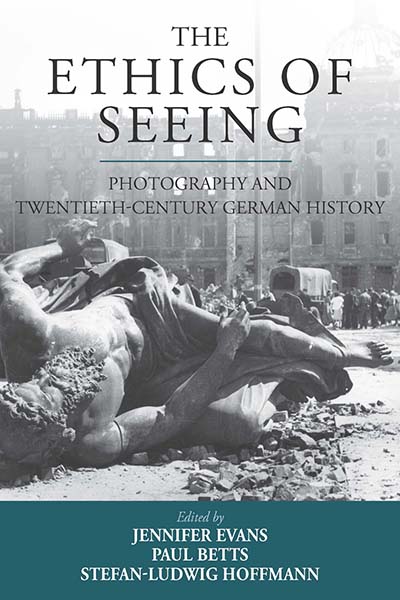 THE ETHICS OF SEEING
THE ETHICS OF SEEING
Photography and Twentieth-Century German History
Edited by Jennifer Evans, Paul Betts, and Stefan-Ludwig Hoffmann
Volume 21, Studies in German History
Throughout Germany’s tumultuous twentieth century, photography was an indispensable form of documentation. Whether acting as artists, witnesses, or reformers, both professional and amateur photographers chronicled social worlds through successive periods of radical upheaval. The Ethics of Seeing brings together an international group of scholars to explore the complex relationship between the visual and the historic in German history. Emphasizing the transformation of the visual arena and the ways in which ordinary people made sense of world events, these revealing case studies illustrate photography’s multilayered role as a new form of representation, a means to subjective experience, and a fresh mode of narrating the past.
Read Introduction: Photography as an Ethics of Seeing
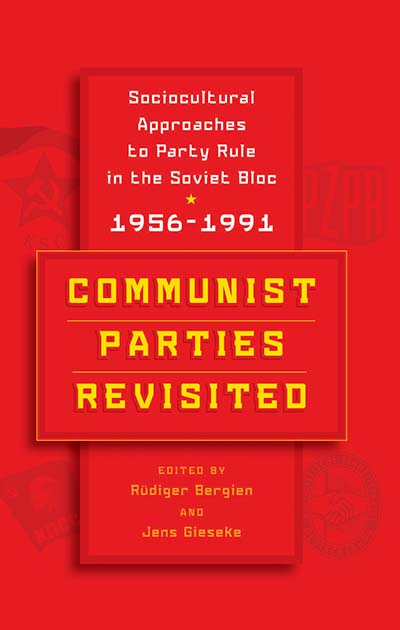 COMMUNIST PARTIES REVISITED
COMMUNIST PARTIES REVISITED
Socio-Cultural Approaches to Party Rule in the Soviet Bloc, 1956-1991
Edited by Rüdiger Bergien and Jens Gieseke
The ruling communist parties of the postwar Soviet Bloc possessed nearly unprecedented power to shape every level of society; perhaps in part because of this, they have been routinely depicted as monolithic, austere, and even opaque institutions. Communist Parties Revisited takes a markedly different approach, investigating everyday life within basic organizations to illuminate the inner workings of Eastern Bloc parties. Ranging across national and transnational contexts, the contributions assembled here reconstruct the rituals of party meetings, functionaries’ informal practices, intra-party power struggles, and the social production of ideology to give a detailed account of state socialist policymaking on a micro-historical scale.
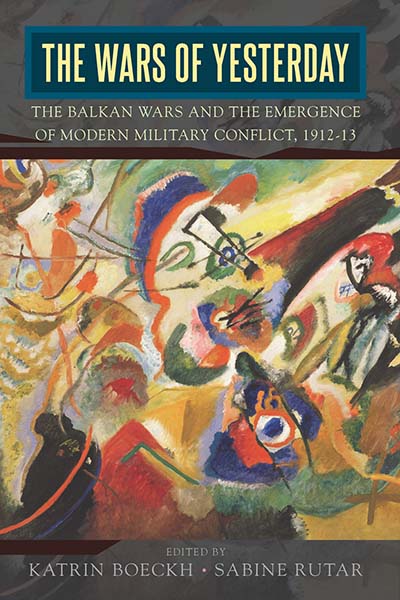 THE WARS OF YESTERDAY
THE WARS OF YESTERDAY
The Balkan Wars and the Emergence of Modern Military Conflict, 1912-13
Edited by Katrin Boeckh and Sabine Rutar
Though persistently overshadowed by the Great War in historical memory, the two Balkan conflicts of 1912–1913 were among the most consequential of the early twentieth century. By pitting the states of Greece, Bulgaria, Serbia, and Montenegro against a diminished Ottoman Empire—and subsequently against one another—they anticipated many of the horrors of twentieth-century warfare even as they produced the tense regional politics that helped spark World War I. Bringing together an international group of scholars, this volume applies the social and cultural insights of the “new military history” to revisit this critical episode with a central focus on the experiences of both combatants and civilians during wartime.
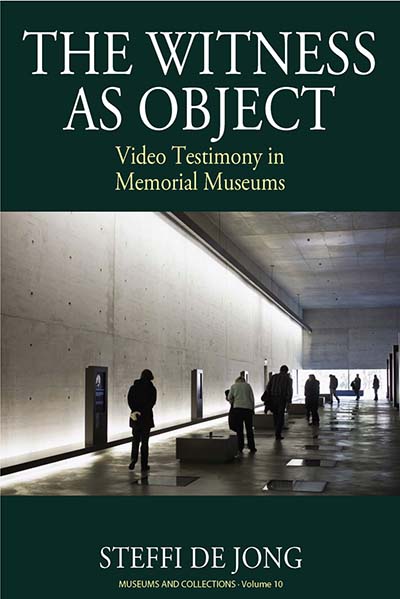 THE WITNESS AS OBJECT
THE WITNESS AS OBJECT
Video Testimony in Memorial Museums
Steffi de Jong
Volume 10, Museums and Collections
In recent years, historical witnessing has emerged as a category of “museum object.” Audiovisual recordings of interviews with individuals remembering events of historical importance are now integral to the collections and research activities of museums. They have also become important components in narrative and exhibition design strategies. With a focus on Holocaust museums, this study scrutinizes for the first time the new global phenomenon of the “musealization” of the witness to history, exploring the processes, prerequisites, and consequences of the transformation of video testimonies into exhibits.
Read Introduction
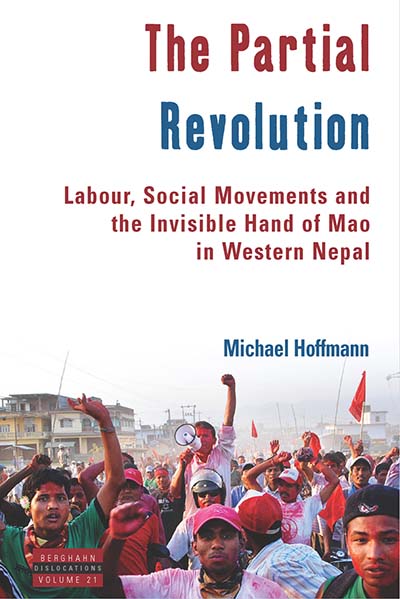 THE PARTIAL REVOLUTION
THE PARTIAL REVOLUTION
Labour, Social Movements and the Invisible Hand of Mao in Western Nepal
Michael Hoffmann
Volume 21, Dislocations
Located in the far-western Tarai region of Nepal, Kailali has been the site of dynamic social and political change in recent history. The Partial Revolution examines Kailali in the aftermath of Nepal’s Maoist insurgency, critically examining the ways in which revolutionary political mobilization changes social relations—often unexpectedly clashing with the movement’s ideological goals. Focusing primarily on the end of Kailali’s feudal system of bonded labor, Hoffmann explores the connection between politics, labor, and Mao’s legacy, documenting the impact of changing political contexts on labor relations among former debt-bonded laborers.
Read Introduction: The Maoist Victory Rally
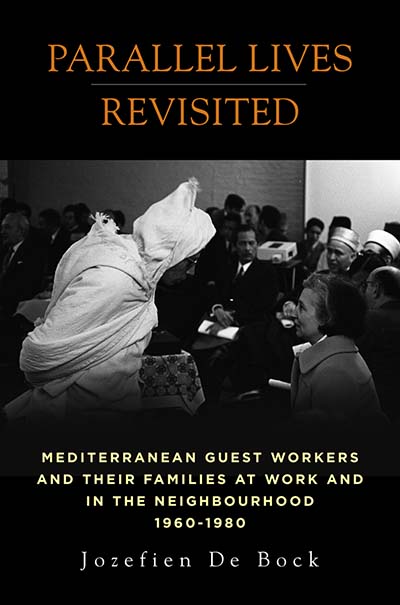 PARALLEL LIVES REVISITED
PARALLEL LIVES REVISITED
Mediterranean Guest Workers and their Families at Work and in the Neighbourhood, 1960-1980
Jozefien De Bock
Foreword by Leo Lucassen
Originally coined in 2001 in a report on racial tensions in the United Kingdom, the concept of “parallel lives” has become familiar in the European discourse on immigrant integration. There, it refers to what is perceived as the segregation of immigrant populations from the rest of society. However, the historical roots of this presumed segregation are rarely the focus of discussion. Combining quantitative analysis, archival research, and over one hundred oral history interviews, Parallel Lives Revisited explores the lives of immigrants from six Mediterranean countries in a postwar Belgian city to provide a fascinating account of how their experiences of integration have changed at work and in their neighborhoods across two decades.
Read Introduction
NEW IN PAPERBACK:
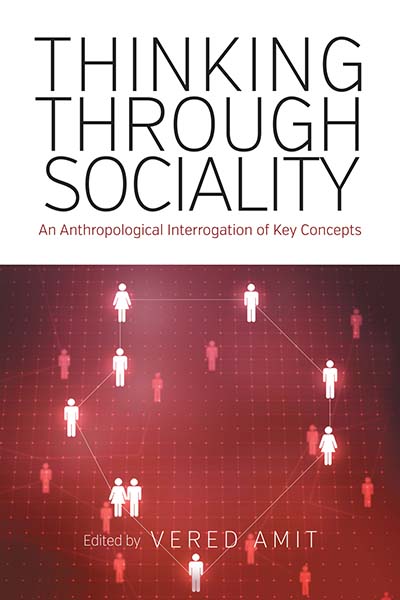 THINKING THROUGH SOCIALITY
THINKING THROUGH SOCIALITY
An Anthropological Interrogation of Key Concepts
Edited by Vered Amit
“[The volume] advances conceptual tools for contemporary anthropology and in provides a valuable source of overviews of the examined concepts, stimulating reading on how to think the configuration of social life.” · Journal of the Royal Anthropological Institute
Read Introduction:Thinking through Sociality: The Importance of Mid-Level Concepts
 THE ENEMY ON DISPLAY
THE ENEMY ON DISPLAY
The Second World War in Eastern European Museums
Zuzanna Bogumił, Joanna Wawrzyniak, Tim Buchen, Christian Ganzer and Maria Senina
Volume 7, Museums and Collections
“…the book highlights the fascinating issue of displaying war, and, through display, defining and exposing certain concepts of national and local identity. In that sense the volume is an important contribution to the growing literature on Central and East European museums in particular, and the issue of presentation of war in museums in general.” · Canadian Slavonic Papers
Read Introduction: The Enemy on Display
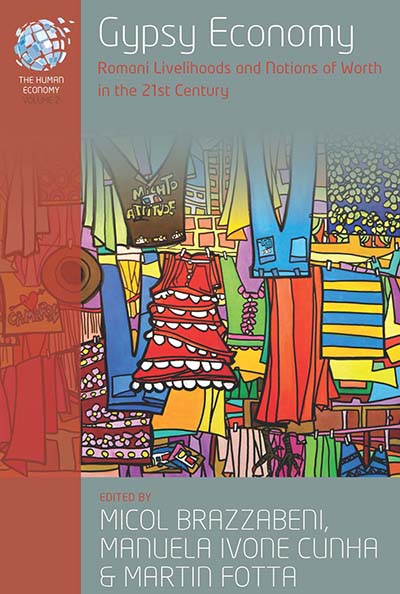 GYPSY ECONOMY
GYPSY ECONOMY
Romani Livelihoods and Notions of Worth in the 21st Century
Edited by Micol Brazzabeni, Manuela Ivone Cunha, and Martin Fotta
Afterword by Keith Hart
Volume 3, The Human Economy
“The publication of Gypsy Economy comes precisely at a time when both academics and the general public need cogent analyses of Roma… This edited volume, then, is a very welcome contribution to the crisis of anti-Gypsyism… [It] is a testament to the diversity and adaptability of Roma labor practices, many of which are traditionally in the nonwage sphere… Gypsy Economy is extremely valuable both to Roma ethnography and to economic anthropological theory.” · American Ethnologist
Read Introduction
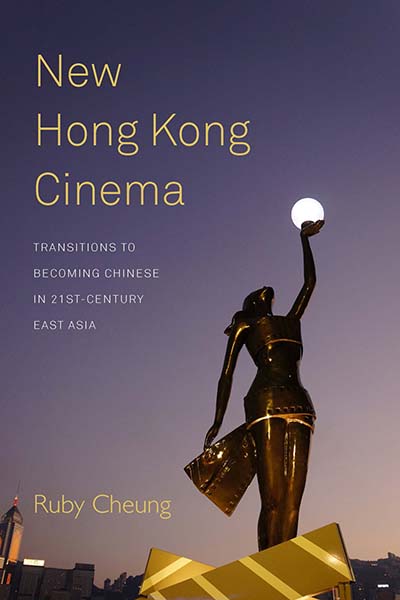 NEW HONG KONG CINEMA
NEW HONG KONG CINEMA
Transitions to Becoming Chinese in 21st-Century East Asia
Ruby Cheung
“An impressive and comprehensive work of seminal scholarship, New Hong Kong Cinema is an invaluable contribution to the study of the Chinese film industry in general, and the contributions of the Hong Kong cinema industry in particular. Enhanced with the inclusion of an eight page Filmography; a 28 page Bibliography; and a four page Index, New Hong Kong Cinema will prove to be a greatly appreciated addition to academic library Cinematic History reference collections and supplemental studies reading lists.” · Midwest Book Review
Read Introduction: The New Hong Kong Cinema, Cinema of Transitions and East Asia
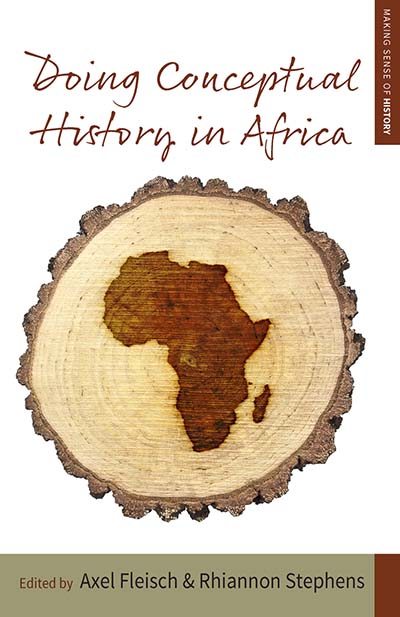 REVISED EDITION
REVISED EDITION
DOING CONCEPTUAL HISTORY IN AFRICA
Edited by Axel Fleisch and Rhiannon Stephens
Volume 25, Making Sense of History
“The volume offers conceptual historians of other world regions a rich trove of new sources and methods (rituals, historical linguistics, proverbs, songs, and patterns in the combination of lexical items, to name a few) for doing conceptual history in areas and for time periods for which we have few written records.” · The International Journal of African Historical Studies
Read Introduction: Theories and Methods of African Conceptual History
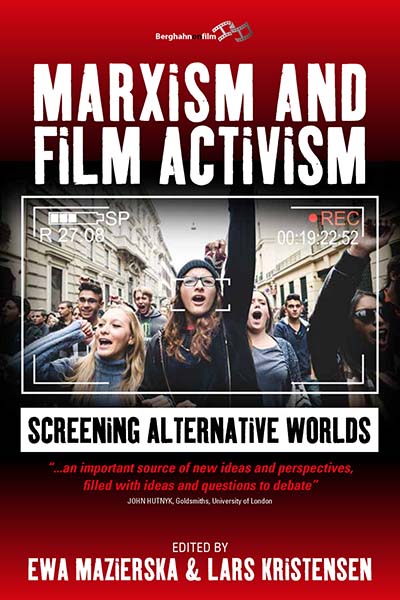 MARXISM AND FILM ACTIVISM
MARXISM AND FILM ACTIVISM
Screening Alternative Worlds
Edited by Ewa Mazierska and Lars Kristensen
“This is an excellent collection of penetrating scholarly treatments, signifying a Renaissance in the study of how activist cinema has reflected Marxist themes and influences.The whole volume is strongly influenced by contemporary French philosophers, Jacques Rancière and Alain Badiou, by the dialectic between theory and praxis, by the dialectic of activism borne of theory and theory catching up with activism, and by the dialectic of ideological sophistication and broad popular impact.” · Dennis Rothermel, California State University, Chico
Read Introduction
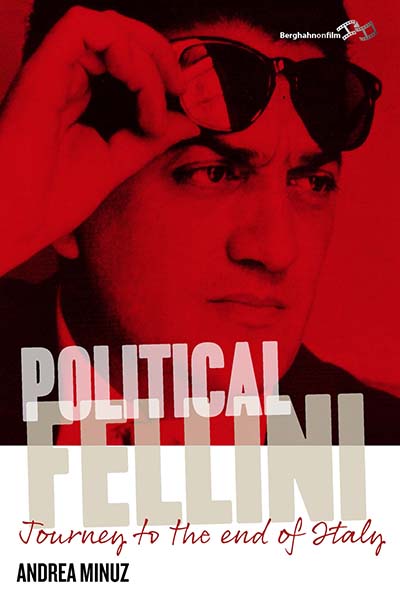 POLITICAL FELLINI
POLITICAL FELLINI
Journey to the End of Italy
Andrea Minuz
Translated from the Italian by Marcus Perryman
“As a scholar deeply immersed in Italian culture, Minuz knows the material inside and out, and his fresh interpretations of Fellini’s films reference both the political and artistic climate in which they were created. Smoothly translated by Perryman, Political Fellini is a truly valuable book, one that delves deep into Fellini as a critic of politics on a larger scale and society as a whole… Highly recommended.” · Choice
Read Introduction: Political Fellini?
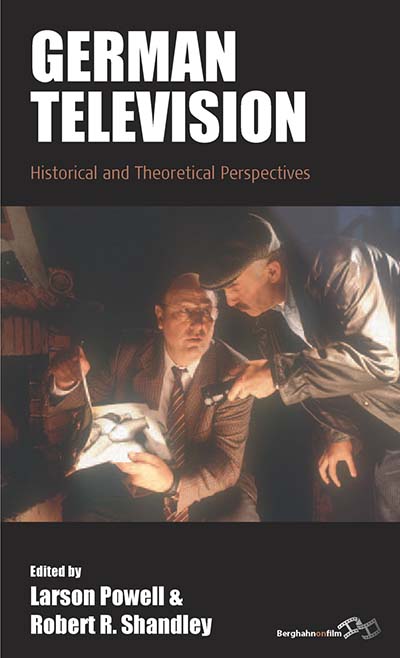 GERMAN TELEVISION
GERMAN TELEVISION
Historical and Theoretical Perspectives
Edited by Larson Powell and Robert R. Shandley
Volume 19, Film Europa
“This collection of essays is the first of its kind in English … this volume offers well-researched, in-depth reflection on the subject of German television ranging from historical overview to case study and spanning the history of West and East Germany, the key relationship between film and television, and the transnational dimensions of programming, technology and audience.” · Historical Journal of Film, Radio and Television
Read Introduction
 THE BOUNDED FIELD
THE BOUNDED FIELD
Localism and Local Identity in an Italian Alpine Valley
Jaro Stacul
Volume 18, New Directions in Anthropology
“This is all fascinating, well documented, and the relationship between local activism and the larger political movements is sensibly analysed…Overall this is a revealing study of the power of locality in framing experience and action.” · JRAI
Please note we have recently released our brand new Winter/Spring 2018 New in Paperback Titles Catalog
JOURNALS
|
The International Journal of Travel and Travel Writing The articles in this issue of Journeys range from the challenge of negotiating the territory between myth and reality in representing the ‘truth’ to the literary and physical space that is the corpus of London. The interstitial perspective of the letters of Thomas Coryat is analyzed and the image of 1939 Greece Henry Miller’s writing presents is examined. This issue concludes with book reviews. |
|
The International Journal of Social and Cultural Practice Volume 61, Issue 4: Quantifying Money’s Quality and Qualifying Money’s Quantity Contributors to this special issue of Social Analysis interrogate dichotomies opposing money’s numerical quantities and its qualities by exploring material and qualitative aspects of quantities in the history of economic thought, through British jewelers, blood money payments in Germanic law codes, and the everyday use of money in Russia, Kenya, and Cuba and among Brazilian Gypsies. |

